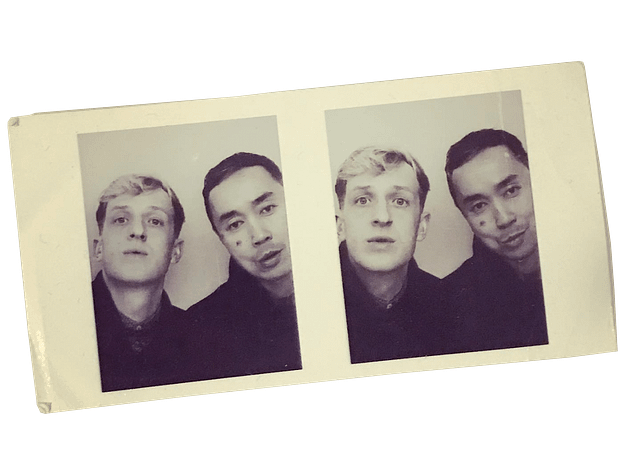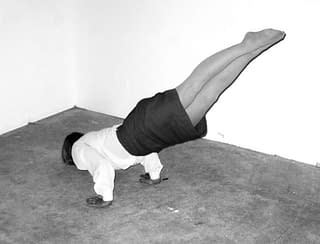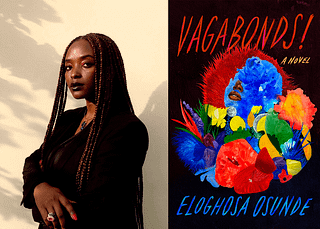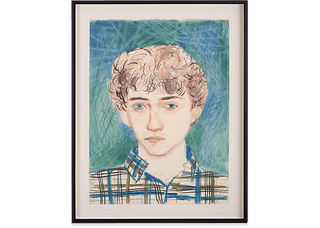
I brought flowers, anxious to make a good impression. I had already met Édouard Louis and Tash Aw the previous evening — after the opening night of the stage adaptation of Who Killed My Father, a group gathered in the garden at Louis’s rental apartment — but today it was just the three of us. We planned to focus on Louis’s latest memoir, A Woman’s Battles and Transformations, which Aw translated from the French, but with the play still fresh in my mind, I was thinking about the book in the context of his larger body of work.
Louis is an autobiographical writer who uses his own body and the bodies of his family to elucidate the forces that circumscribe society. In his breakout debut, The End of Eddy, he depicted in unsparing detail the homophobia and class violence that made his life unbearable as an effeminate child in his working-class village in the north of France. In successive books he would use his father (Who Killed My Father) and again his own life (A History of Violence) as his starting points. Now, in A Woman’s Battles and Transformations, he excavates the life of his mother in order to talk about masculine domination.
I confess, though, that I did not intuit that Louis’s preference to approach the personal with a sociological lens would extend to interviews, so I arrived at the apartment with a list of mostly personal-leaning questions. I was not trying to pry secrets out of Louis or Aw, but I longed for answers about how to live a better, more courageous life. How do you bring yourself to look so closely at your past, your family? I also wanted to plumb Louis and Aw’s relationship, because I often find friendship between men inscrutable. The two writers have exchanged work with each other for years, but this was their first time collaborating as an author-translator pair. How did it feel to breach that new territory?
I suppose I shouldn’t have been surprised that we never lingered long in emotion or memory. Even in discussing friendship, Louis and Aw remained tethered to ideas. But I also realized this conversation was far more exciting than what I had imagined. I was seeing a friendship unfold in real time rather than a friendship framed for presentation. I didn’t want to interrupt.
SQ: How did you two meet?
TA: We first met at a literary festival in Norway. I had just finished my talk and Édouard was going into the same room to do his talk. We met at the door and I told him that I knew his village. I could see that he was really, really doubtful, until I gave him more details. At that point I had lived in the village for fourteen years, because my partner — now husband — is from the region and inherited a small house.
A few months prior to the festival, our neighbor had come running into the house, Have you heard of this disgusting book that’s been published in Paris? It contains all sorts of lies.
ÉL: [Laughs]
TA: Then I read it, The End of Eddy, and was completely hooked.
ÉL: The thing is, it’s completely improbable. The village is so remote — there is no train station, it’s in the north. It’s not like the south of France where lots of people go to vacation in even the small villages. When he started talking about it, I thought he was like a stalker. But then it was very interesting to meet someone with the eyes of an outsider — a gay Chinese man, a writer, a novelist. It felt like I was reentering the village in a way. When I published The End of Eddy — because I was talking about the violence in the village, because I was talking about homophobia, because I was talking about racism — everyone was calling me a liar. To have someone like Tash say, Yes I witnessed that, helped confirm that I wasn’t going crazy.
SQ: When did you begin sharing your work with each other?
TA: Very early.
EL: When Tash is finishing his manuscript, I will read it. And when I finish my manuscript, Tash will read it. Then we have days of what we call “coordination”: we discuss what could be reinforced, what could be erased, what should stay. I only have this kind of close friendship with Tash and maybe two other people.
Our creation and friendship have become so intertwined. Basically we have conversations about literature and politics almost every day. I think that friendship is a kind of avant-garde laboratory for creation — and there is no avant-garde without friendship. When you say things that people don’t want to hear, when you show things that people don’t want to see, you expose yourself to extremely violent reactions. If I didn’t have people like Tash, or Didier Eribon in Paris, I would surrender.
SQ: How did you decide to work on this translation together?
ÉL: It was our publisher’s idea, and I said it would be a dream to have Tash as the translator because of our mutual understanding. And the story of my mother — he knew it all before I wrote it, because he’s my friend. Every day when something was happening with my mother, I was talking about it to Tash, so it made him the perfect translator because he thought of this story as flesh.
TA: I never wanted to impose myself on Édouard’s work. It’s a very big responsibility, translation, and if you take it on you have to be really aware of what you’re doing. But I think because I knew the village, because I knew the people, it felt very natural to me. After all, what you’re translating is not just the language, you’re translating experience. You’re trying to get people to understand that this is not just the story of a woman, it’s the whole society that this woman represents.
ÉL: That observation “this is not just the story of a woman” is also important — it came up during the translation process. One person at the publishing house wanted to call the book My Mother’s Struggles and Transformation, instead of A Woman’s Struggles and Transformation. For me and Tash it was important to stick to the title because what is interesting is not my story or my father or my mother or my little life — I really don’t care about that. I see my work as a kind of autopsy of society. You take the body of someone, like the body of my mother or the body of my father, or my own body, and you open it, and you have the whole society inside it.
TA: That’s partly why I felt an immediate emotional connection, because I saw my mother in it. And so many other mothers that I know. Although obviously Édouard’s mother is very specific to his village, and she has a particular language, this is also a story of the women I grew up with.
ÉL: Yes. People also always suspect autobiography of being nombriliste or self-centered, but I think it’s the absolute opposite. When you write autobiography you write about the life that you didn’t choose, you write about contexts you didn’t choose, a family that you didn’t choose, a name that you didn’t choose. Not like in fiction where you choose everything. Maybe fiction is much more nombriliste because someone works for five years on the character that they choose. I’m not making a statement about fiction — the writers I admire most are fiction writers. I’m just saying this in order to reshape the way we talk about autobiography.
SQ: I feel that surgical precision of accessing a society through the body of a single person in your work. Your books have this clarity and concision; there are so few digressions. In one scene in this book, for example, you begin to talk about your father, but then say, “That’s not the story here.” Can you talk about the origins of your style? And is concision one of the tools that you use to access complex problems?
ÉL: There are two things: the first one is that sociology has been very influential for me. I think that in fact a lot of autobiographies are narcissistic because they are psychological; they circulate around the psychology of the mother, the psychology of one person. Particularly in the U.S. there is a psychological approach to facts. When people talk about poverty, they talk about being depressed, losing hope — as if it were a personal thing and not a structural thing. For me the reading of Karl Marx and Pierre Bourdieu and Hannah Arendt was very important. They shape my writing every day.
But second: the language itself, it’s almost by accident. Because we were completely dispossessed from access to books in my childhood, the way to escape my milieu was theater. When I was in middle school, I was this little gay boy, no one wanted to play with me and so I was desperately trying to make friends and would go to clubs — the calligraphy club, the chess club, the comic club even though I hated comics. I went to everything in order to try to socialize. One day there was a theater club and I went — not because I wanted to be Molière or Isabelle Huppert — just because I wanted to have friends. And it was unbelievably easy for me, because I knew what it was to pretend to be someone else.
So for many years, when my brain was still building itself, my only access to texts was through theater. And it became such a big part of me and of my writing. When I write my books I don’t think, I should not make digressions. It’s not a statement — my favorite writers are Tash Aw, Garth Greenwell, Marcel Proust, William Faulkner, experts at creating those incredibly beautiful digressions. But for me when I write I always think about the sentence on stage.
SQ: Tash, what was it like translating Édouard’s sentences?
TA: It was like having a conversation with him in real life. I think very skilled translators, who translate all the time, are able to quickly connect to the same wavelength as the writer, and I’m not sure how easily I would be able to do that a writer I didn’t know. But with Édouard that wavelength already existed.
ÉL: He knows my strange syntax.
SQ: Édouard, in the book, you also talk about the value of distance — how going away for school helped you see your mother and the constraints around her more clearly. When you were writing this book, did you need distance from her again? Or did you talk to your mother during the writing process?
ÉL: I was talking with her quite a lot. I wasn’t taking things for granted. Everything she was telling me — I was trying to analyze it. I of course also asked permission to put the pictures of her in the book, and to put her real name. If you check, in The End of Eddy it was a false name, and in this book it’s her real name.
But yes, distance was part of what allowed me to understand the story. I saw the story of my mother the day that I was far from my mother. The same way that I saw my whole story the day I was far from my story. When I went to the city to go to high school, I saw women who had more power and easier lives — because they had diplomas, because they had money. They were more free, and that day I understood how unbearable the life of my mother was, how unfair it was.
It’s the opposite of the mainstream thinking — that you have to be part of something or you have to be something in order to talk about it. For example, when I was a little gay child I think so many straight women or men would have been much more able to talk about homosexuality than me, because I was part of it, and the fact that I was part of it, was making it impossible for me. I became a homophobic person in order to protect myself. Sometimes the fact that you belong to a reality is the reason you are unable to talk about it. You need people from the outside to appropriate your life and talk about it in order to make you able to talk about it. Of course it’s a process. I don’t think that you should shut your mouth for the rest of your life. But it’s a process, a political process, people can talk on your behalf, and then it enables you to talk. The history of speech is much more complex than people believe nowadays.
I would say to my mother that the way men treat women is unbearable. And my mother would tell me, Oh no, it’s just your father. He’s like this. He’s moody. But my sister was treated the same way, and my brother was treating women the same way. My mother, she never had access to Angela Davis, Judith Butler, Simone du Beauvoir. She didn’t have the chance to learn about the structural violence that targets women.
TA: And also she’s in the system and she needs something to survive, it’s a defense mechanism. If you ask my cousins if they have a hard life, a lot of them will say, No my life is normal.
ÉL: If my mother was writing autobiography she wouldn’t talk about masculine domination, and for me that would be a problem.
SQ: This reminds me of the scene in which you write that, although your mother has undergone a transformation — an escape — it’s also not a simple story. Her transformation was still circumscribed by class violence. It makes me think about where your experiences and opinions, political or otherwise, might still diverge. How do you approach those divergences? How do you build solidarity with those you’ve left behind or those who are in different stages of their life?
ÉL: Fighting for people doesn’t mean agreeing with people. I also fight for people that I don’t like. Some of the people in the village, they are violent and racist, and I’m still fighting for them. Because I believe that their actions are linked to circumstances that they can’t control. If you start to think, Do people deserve me to fight for them, before fighting for them — it’s a problem. You become a tool of capitalism. Politics should be about naming injustice and unfairness, not anything else. So this kind of distance is not an issue for me.
TA: Is it even an issue for literature? As a writer, do you build solidarity? Is that one of the things that you set out to do? I don’t think I do.
ÉL: I wouldn’t say so, no. Not solidarity. Struggling or fighting, maybe.
TA: I’m not trying to represent anyone. I’m trying to artistically depict lives and stories as I see them, in as true and as complex a way as I can see them. But I think solidarity comes with a feeling of needing to represent a group of people. We speak for a struggle, but whether or not those people involved in the struggle actually identify themselves in our writing, I don’t really think about.
ÉL: Oui that’s it. I feel solidarity in the sense that I feel imprisoned, in the sense that I feel I have to talk about this world again and again, about working class people again and again. I feel assaulted in my everyday life by class violence, by the invisibility of those people, by the insults that people pronounce in the political field against poor people. There is this violence that assaults me in my everyday life that makes me want to be solidaire, to write about these people. But as Tash says it’s a complex solidarity, because it’s not the solidarity that I feel when I go out to demonstrations, for example, which is a big part of my life. I demonstrate without reserve. Sometimes at protests I hear homophobic things like, for example, they would say Macron enculé, which is an insult that means you are penetrated and therefore you are nothing. But when I go in the street I’m there for a particular struggle. I’m here for working-class people. Or I’m here for Palestine. Solidarity is limitless for me when you are in the street. You question it in other spaces, in other moments.
TA: Édouard you also talk very powerfully in the book about your own culpability in the system, before you had critical distance.
ÉL: It was very important to me to show that, before this liberation, all the violence my mother was suffering from — I was a part of it. Children are fascists, basically. I was seeing my mother being treated so badly by men and as a kid I would reproduce this; I didn’t want her to talk, I didn’t want her to exist. Kids are fascist in the sense that they learn very quickly the way the world functions and reproduce it.
TA: They reproduce it without nuance.
ÉL: They’re like bombs. But when my mother changed, and when I changed, and we escaped, we built another relationship which was based on an undoing of this mutual violence. Every day my mother is trying to not be the woman that she was when I was a child. And every day I’m trying to not be the child that I was with her when I was a kid.
SQ: I’m curious to hone in on how you talk about gender in the book. You write: “Can I truly understand her life if it is specifically distinguished by being a woman’s life — if I am constructed, perceived, and defined by the world around me as a man?… What is a man? Virility, power, camaraderie with other boys? I never had any of that.… In the same way Monique Witting maintains that lesbians are not women, that they escape from the constraints of that identity, the person that I am was never a man.” I was interested here in how you both acknowledge and refuse this identity, and I wonder if you could say more about how you conceive of your masculinity?
ÉL: My exclusion from the system of masculinity was the beginning of everything for me. It’s what put me outside of my family, put me outside of the groups of kids at school. But it was also the possibility of my freedom. Because I was expelled from masculinity, I couldn’t always afford to reproduce all those masculine things that destroy men. My father for example, is so destroyed that today, at only fifty-five-years old, he cannot walk anymore, he cannot breathe without an apparatus, all of that is linked to masculinity and class.
Someone might see me as a man in the streets. And there are things that don’t happen to me because I’m socially perceived as a man — I am much more protected from sexual assault, for example. But at the same time, behind my face there are so many complexities. Social identities are not snapshots, they are not instant, they are a process. I don’t like the mainstream approach to politics, when people say, straight men or white men or men in power, because what is interesting is not the label, what is important is the process. What is interesting is not straight, it is homophobia. What is important is not white, it is racism. What is important is not man, it is masculine domination.
TA: It also depends what space you’re in. Masculinity is amorphous. On the school soccer team, for example, you’re divested of that masculinity by virtue of your queerness, but in front of your mother you are still a cis man. I think a lot of the time people fail to understand that masculinity and femininity apply differently in different spaces.
ÉL: Exactly. In a strange way, we are going through the least intersectional moment of politics, because we tend to talk more and more about politics as a label and we don’t intertwine all of those things together — the class, the race, the sexuality, and how they change in time and context.
I’m exaggerating a little bit out of effect, but I think there is really a lack of it. Once, I was with a political group of people I love, people from the left, and someone said to a straight guy, You’re straight what do you know about sexual violence. And this straight guy was raped by his uncle when he was eight years old. How can people assume a social trajectory, a personal trajectory, from a label? What I try to do in my books is bring all those complex things together, to make us stronger against racism, or against homophobia. This is my goal. Homophobia nearly killed me.


